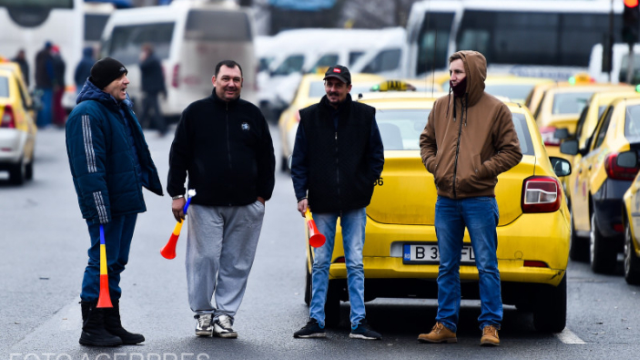Protests by transporters in Romania
Taxi drivers have protested in Bucharest against what they call the unfair competition of Uber affiliated drivers.

Mihai Pelin, 21.12.2017, 13:48
The taxi drivers’ protest on Tuesday disrupted traffic in downtown Bucharest, after tens of cars were parked right in front of the Government headquarters. Taxi drivers are discontent about what they call the unfair competition of the Uber affiliated drivers, who, in their opinion, are functioning illegally as they do not hold a transport licence.
A day before, the Bucharest City Hall had made public its intention to change taxi regulations in the capital city, and all companies operating in the field should have a licence, Uber included. After talks with the line authorities at the government headquarters, representatives of the Confederation of Authorised Operators and Transporters in Romania, COTAR, haven’t managed to obtain a clear promise from the Government that taxi- laws will be amended, so that those carrying out transport activities without having a licence be sanctioned by the law.
Taxi drivers say they do not give up the idea of organising protests and even think of new forms of protest, the President of COTAR, Vasile Ştefănescu, says: ”With all due respect, we all have four-wheeled cars and know what we have to do. We also have authorisations, although we might not get new ones, we have ring roads, we have everything is needed in the country, too, to get on the move. So, we will see if we choose to stay indoors, everyone in his home, as the holidays are approaching not only for the Government but also for us. You should know the situation is very serious, as the illicit transport of persons gains ground at a fast pace. It exceeds our capacities, at the moment. If we are 110 thousand transporters of persons – taxi and transport of persons by coaches according to a timetable, there are some 140 thousand unlicensed transporters. There are 10,000 such transporters in Bucharest alone, and they are affiliated to Uber.”
Representatives of the aforementioned firm take a defensive stand saying they provide IT services and the affiliated drivers are Authorised Natural Persons who can conduct commercial activity and furthermore, they pay taxes. Such conflicts are registered in several countries and the issue reached the European Court of Justice, which ruled that Uber is a transport service. The Court underlined that the platform, which connects amateur drivers who use their own cars to persons willing to travel within a town or a city, is not a digital service.
Consequently, under the current legislation, the decision on how to regulate this type of services belongs to the Member States. This company has been present in Romania for three years and has over 450,000 users, of which 350,000 in Bucharest alone. Romania is the second largest market in Central and Eastern Europe, after Poland, and the fifth largest in the European Union.






























